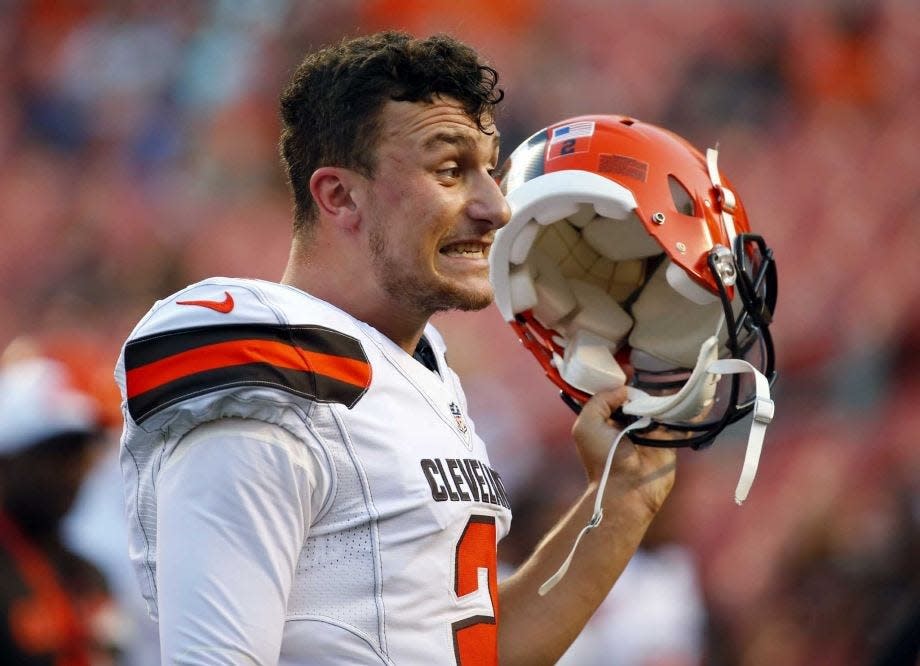Johnny Manziel's story a tragedy in three acts

- Oops!Something went wrong.Please try again later.
- Oops!Something went wrong.Please try again later.
- Oops!Something went wrong.Please try again later.
- Oops!Something went wrong.Please try again later.
- Oops!Something went wrong.Please try again later.
- Oops!Something went wrong.Please try again later.
- Oops!Something went wrong.Please try again later.
Just when Cleveland Browns fans were enjoying a spark of hope about the upcoming season and celebrating Joe Thomas' induction into the Pro Football Hall of Fame, along comes Netflix with a special about Johnny Manziel, the team's 2014 draft bust who made more news for his antics than his accuracy.
Rarely has such an opportunity been so spectacularly squandered.
Instead of being in the prime of his NFL career, Manziel, 31, has become a byword for what happens when a person blows through the guardrails.
It's a toxic tale of privilege, immaturity, fame, money, substance abuse, domestic violence and more second chances than a time traveler.
It's the story of what can happen when a person's worst instincts are indulged because the talent they possess is deemed worth the risk.

Not a stint in rehab, not arrests for domestic violence, not NFL fines, not losing two agents was enough to keep Manziel focused on Job One.
Now, Manziel isn't even remotely the first NFL player to blow a million-to-one chance to star in America's favorite game. Two weeks ago, Browns linebacker Perrion Winfrey joined the list of players jettisoned by a team that no longer has to put up with a player's antics out of sheer desperation.
No NFL team's roster, past or present, has been a roll call of virtue. NFL Commissioner Roger Goodell probably still wakes up screaming at the mention of Ray Rice, Jovan Belcher, Antonio Brown and Henry Ruggs II.
Even nerdy Browns linebacker Myles Garrett was suspended indefinitely in 2019 after trying to behead a Pittsburgh Steeler with a helmet.
A quarterback's job
Everyone is fully aware that the Browns are rolling the dice on quarterback DeShaun Watson, whose past behavior was so tawdry, attending therapy is a term of his contract. But being a creep didn't preclude the other 31 teams from making Watson an offer; the Browns just happened to offer the biggest bag of guaranteed cash.
An NFL quarterback doesn't just throw a football. By nature of his position, he is the face of his franchise.
He guides the young players and respects the veterans.
He is supposed to be the team's go-to, not a whatever-happens-in-Vegas wingman.
But Manziel wasn't remotely interested being a fisher of men. For example, the Browns' former troubled wide receiver Josh Gordon may still hold the league record for time on suspension, but instead of working to steer Gordon away from temptation, Manziel made Gordon his plus-one, and the two partied like it was 1999.
However, let's not kid ourselves. We love train-wreck stories. It isn't news if a train doesn't jump the track. There isn't much call for documentaries on players who have done everything right unless they possess extraordinary talent, like LeBron James or a Michael Jordan.
No one is clamoring for a Netflix documentary on retired NFL star Warrick Dunn, whose charity has built 100 homes in partnership with Habitat for Humanity, Joe Thomas, one of the best Cleveland Browns to ever play the game.
An American Icarus
From to Manziel to Hunter Biden, we may say we're disgusted but we're also fascinated by people who not only color outside the lines, but ask: "Lines? What lines?"
An American Icarus, Manziel was a train wreck even before he reached the NFL, which is why we must suppose Netflix deemed his story a ratings-grabber.
His timeline of troubles lasted longer than the average NFL career, going back to 2012 at Texas A&M, where he became the first freshman in history to win the Heisman Trophy. It's also the same year he pleaded guilty to misdemeanor assault and was caught with a fake driver's license following the fight.
College Station, Texas, was Manziel's kingdom, and really, who was going to tell the king to knock it off?
Part of the first generation of NFL stars to grow up under social media, Manziel's every escapade, including his now-infamous "money" sign, was fodder for viral videos. His father openly worried that unless his son got help, he probably wouldn't live to reach 24.
In 2018, Manziel revealed that he has bipolar disorder, and that he was abusing alcohol to deal with his illness. It helps to explain a lot, but it's not a get-out-of-trouble card. An estimated 5 million Americans suffer from bipolar disorder, and most have managed not to make headlines.
The NFL deserves credit for addressing the issue of mental health, but it's also a billion-dollar business, heavily dependent on image and the goodwill of fans who are willing to attend games, buy jerseys, and purchase the products advertised. A stigma remains in our culture and among too many fans who still equate mental illness with weakness, particularly if it preempts a game roster.
Manziel has washed out of the league. It's probably the best thing that ever happened to him.
Mental illness and sports: Sometimes, supermen crash to earth
Charita M. Goshay is a Canton Repository staff writer and member of the editorial board. Reach her at 330-580-8313 or charita.goshay@cantonrep.com. On Twitter: @cgoshayREP
This article originally appeared on The Repository: Netflix special about Johnny Manziel recounts his wild life

